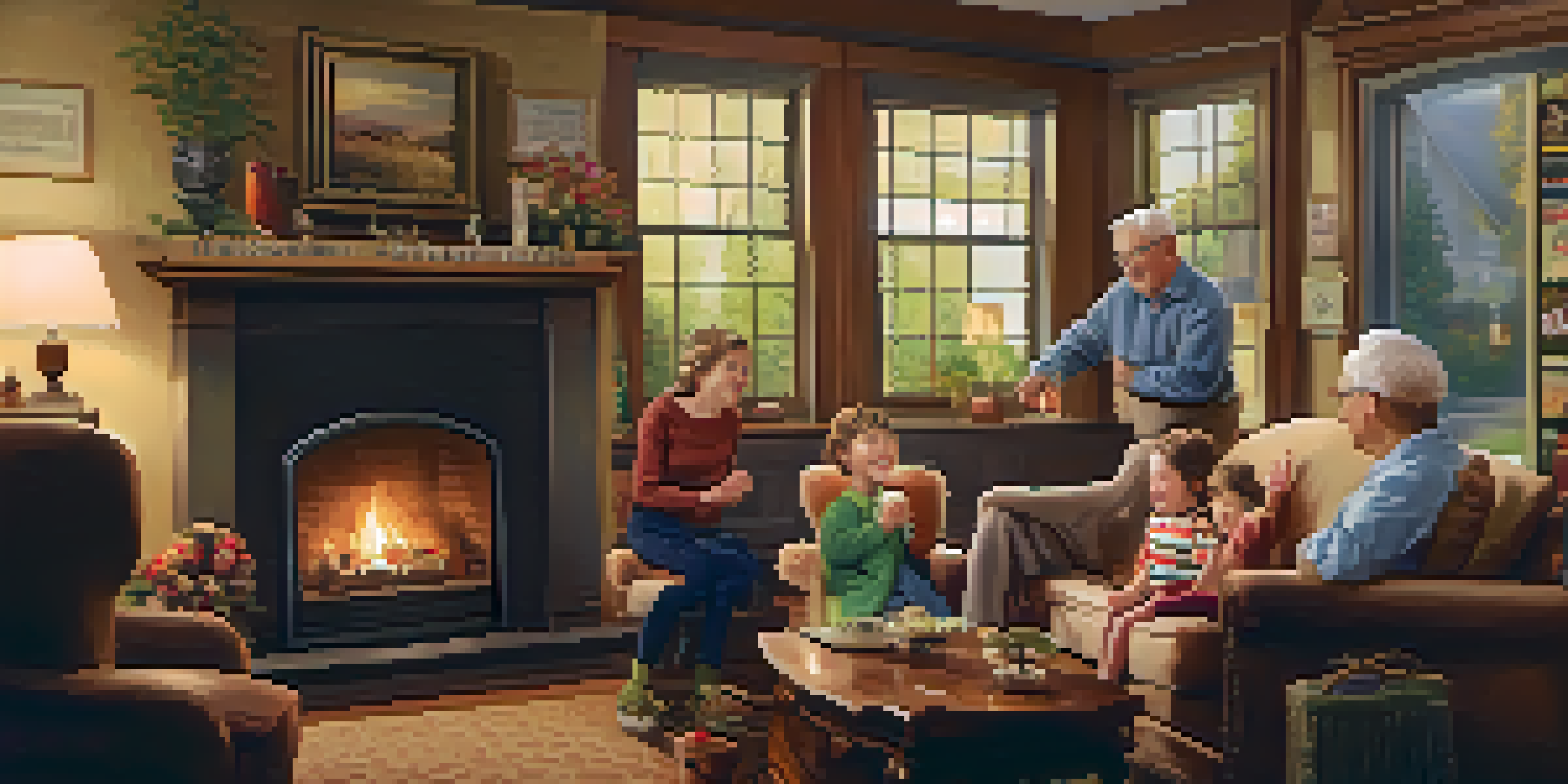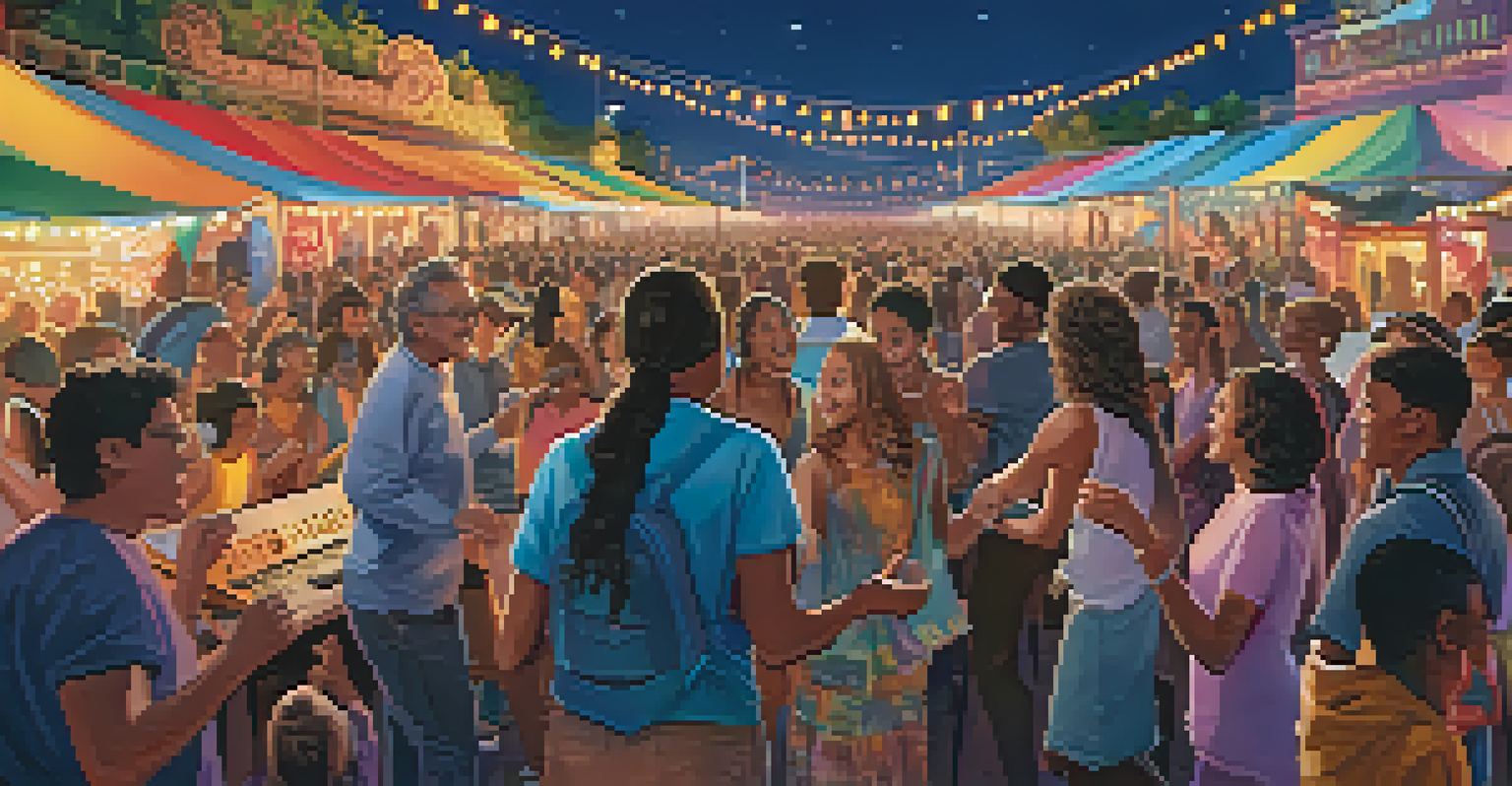The Role of Music in Bridging Generational Gaps

Understanding Music as a Universal Language
Music has an incredible ability to transcend age barriers. It speaks to our emotions and experiences, creating a shared space where people from different generations can connect. For instance, a classic rock song from the '70s might resonate with a grandparent while also appealing to their grandchild, showcasing music's timeless nature.
Music can change the world because it can change people.
When we listen to music together, we often find common ground. This shared experience can lead to conversations that bridge the gap between generations, allowing for a deeper understanding of each other’s lives. It’s not just about the notes or lyrics; it’s about the stories and memories that come alive through the music.
Moreover, music often evokes nostalgia, which can be a powerful tool for connection. When older generations hear a song from their youth, it can spark stories that younger people may find fascinating. This exchange of memories helps to foster empathy and appreciation between different age groups.
Music's Role in Family Traditions and Gatherings
Family gatherings often feature music that brings generations together. Whether it’s a holiday celebration or a casual get-together, music sets the tone and often becomes a focal point for bonding. Think about the way a sing-along can unite family members, regardless of their age.

Songs passed down through families can carry significant emotional weight and history. For instance, a lullaby sung by a grandmother to her grandchild can become a cherished memory, bridging the gap between their experiences. This shared tradition reinforces family ties and creates lasting memories.
Music Bridges Generational Gaps
Music creates shared experiences that connect people of different ages, fostering understanding and conversation.
Moreover, playing music from various eras during family events can spark discussions and curiosity. When younger family members ask about the stories behind certain songs, it opens up a dialogue that helps everyone understand each other’s perspectives better.
Exploring Music Genres Across Generations
Different music genres often define distinct generations, from jazz and rock to hip-hop and pop. Each genre carries its own cultural significance and often reflects the social issues of the time. Exploring these genres together can provide insights into the values and experiences of various age groups.
Without music, life would be a mistake.
For example, a teenager might introduce their parents to a contemporary pop artist, while the parents might share classic hits from their youth. This exchange can lead to a richer appreciation for diverse musical styles and the stories behind them. It allows for a mutual exploration of tastes and preferences.
Additionally, collaborating on music projects, like creating playlists or attending concerts together, can enhance the bond between generations. It transforms music from a mere listening experience into a shared adventure that strengthens relationships.
The Impact of Music on Memory and Identity
Music often serves as a powerful trigger for memory, helping to shape our identities. For many, specific songs are tightly linked to significant life events, such as weddings, graduations, or even heartbreaks. Sharing these memories through music can help bridge understanding between generations.
For example, a song that was played at a parent’s wedding might evoke a strong emotional response in their child when heard years later. This shared emotional experience can lead to meaningful conversations about love, relationships, and family history.
Intergenerational Music Traditions
Family gatherings often become enriched by music, reinforcing emotional bonds and creating cherished memories.
Moreover, discussing the ways music influences our sense of self can help different generations understand each other better. It highlights how our musical preferences are often tied to our life experiences, offering insights into our values and beliefs.
How Music Fosters Empathy and Understanding
Music can serve as a mirror, reflecting the feelings and struggles of different generations. Through lyrics and melodies, artists often express universal themes such as love, loss, and hope, resonating across age groups. Engaging with these themes can foster empathy and understanding.
Listening to songs that address social issues can also spark discussions among generations. For example, a protest song from the '60s can lead to conversations about current social movements, helping younger generations understand the struggles of their elders. This exchange cultivates mutual respect and shared values.
Furthermore, participating in music-related activities, like attending concerts or joining community choirs, can create opportunities for generations to engage with one another. These shared experiences promote not just understanding, but also a sense of belonging within the community.
The Role of Technology in Music Sharing
In today’s digital age, technology plays a crucial role in how we share and discover music. Platforms like Spotify and YouTube make it easy for different generations to explore music together, breaking down barriers that once existed. Sharing playlists can become a fun way for families to connect over their favorite songs.
Additionally, social media allows users to share music and engage in conversations about it. For instance, a TikTok trend featuring an old song can introduce younger audiences to classic hits, creating a bridge between generations. This not only enriches their musical taste but also fosters a sense of community.
Technology Enhances Music Sharing
Digital platforms facilitate music exploration across generations, allowing families to connect over shared playlists and discussions.
Moreover, apps that promote collaborative playlists or music-sharing features can encourage interaction between generations. Family members can curate playlists together, discussing song choices and why they resonate with them, which deepens their understanding and appreciation for each other’s musical preferences.
Creating Intergenerational Music Experiences
Creating opportunities for intergenerational music experiences can have a profound impact on relationships. This could be as simple as organizing a family talent show or attending a concert that features artists from both older and younger generations. Such events can inspire conversations and shared experiences.
Music workshops or classes that cater to all ages can also be effective in bringing generations together. Learning to play an instrument or singing in a group can foster teamwork and understanding, breaking down barriers that might exist due to age differences. The joy of creating music together is a powerful connector.

Moreover, community events that celebrate music across generations can help promote inclusivity. Festivals that feature diverse musical acts encourage families to engage in conversations about their musical backgrounds and experiences, reinforcing the idea that music truly is a universal language.